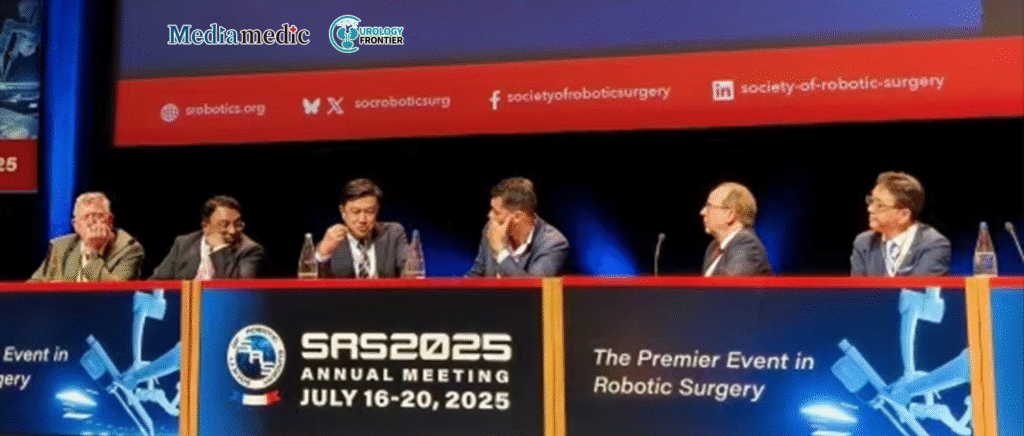
From July 15 to 18, 2025, the annual global summit in the field of robotic surgery—the World Congress of the Society of Robotic Surgery (SRS)—was held in France, drawing together leading surgeons and pioneers in robotic technology from around the world. The event featured discussions on cutting-edge innovations and future trends, along with the presentation of dozens of state-of-the-art surgical robot platforms and their development teams. Representing one of China’s foremost urologic oncology institutions, the Department of Urology at Fudan University Shanghai Cancer Center, led by Professor Dingwei Ye, actively participated in this global exchange, showcasing China’s expertise and innovation on the international stage.
Sharing Surgical Expertise in Prostate Cancer and Leading Global Dialogue
As a core member of the conference committee, Professor Dingwei Ye was invited to speak in the main session titled “Key Discussions in Robotic Urologic Surgery in the Modern Era.” He joined an elite panel of global leaders in robotic urology, including Professor John W. Davis from MD Anderson Cancer Center (USA), Professor Nathan S. from University College London Hospitals (UK), and Professor Tony Costello from the Royal Melbourne Hospital (Australia).
Professor Ye represented China in a high-level discussion focused on surgical strategies and best practices in managing high-risk prostate cancer. The session sparked enthusiastic engagement from international peers and highlighted the global relevance of surgical insights from China.

Supporting Domestic Innovation and Promoting International Collaboration
In a dedicated session spotlighting “HaiShan I,” a domestically developed surgical robotic platform, Professor Ye was also invited to provide expert commentary. He remarked, “Domestic systems like HaiShan I demonstrate excellent spatial adaptability and operational stability. We look forward to strengthening international collaboration to accelerate the clinical development and evaluation of these platforms, ultimately benefiting patients in China and around the world.”
Spotlight on the Next Generation: Showcasing Excellence in Surgical Skill
Professor Hongkai Wang, one of the youngest Chinese speakers at the SRS Congress and a rising star from Professor Ye’s team, took the main stage to share his experience with functional-preserving robotic radical prostatectomy using new-generation robotic platforms. His presentation, which emphasized technical refinement and clinical outcomes, received high praise from the session chairs, demonstrating that the surgical expertise of the younger generation at Fudan University Shanghai Cancer Center has reached a world-class level.

Fudan Urology: From “Fuchong Technique” to Breakthroughs with HaiShan I
Professor Dingwei Ye pioneered the “Four Precision” approach to prostate cancer—precision screening, precision surgery, precision translation, and precision clinical research—with a strong focus on robotic precision surgery that balances both quality and quantity. Through this vision, he developed the innovative “Fuchong Technique”, a multi-dimensional optimization of robotic radical prostatectomy. This includes:
- microscopic neurovascular bundle dissection
- meticulous bladder neck preservation
- reinforced urethral reconstruction
- anatomical restoration of pelvic floor muscles
- targeted hemostasis and anti-leakage strategies
This comprehensive technique aims not only to achieve complete tumor resection but also to preserve the patient’s quality of life. Results have been impressive: postoperative erectile function recovery is satisfactory, urinary continence (both immediate and long-term) is among the best globally, and five-year survival rates for early-stage patients approach 100%.
For patients with advanced or oligometastatic disease, Professor Ye’s team has led pioneering clinical trials—including salvage radical surgery, combination approaches integrating surgery with radiotherapy, and local treatments paired with next-generation anti-androgen therapies. These efforts have opened new treatment avenues for patients previously deemed inoperable, significantly improving cure rates and overall survival.


